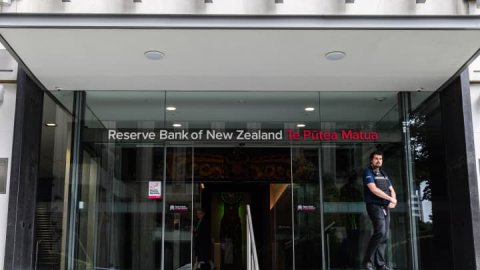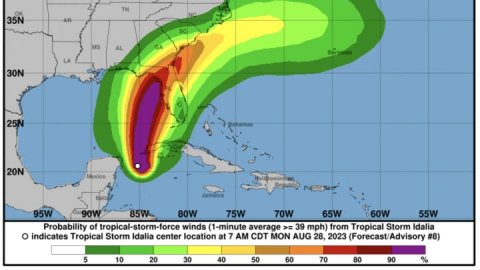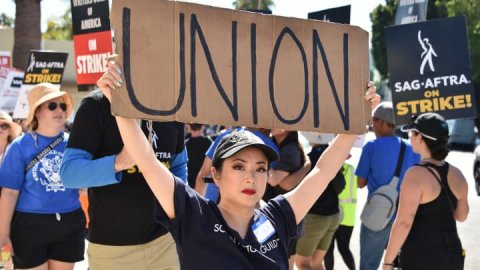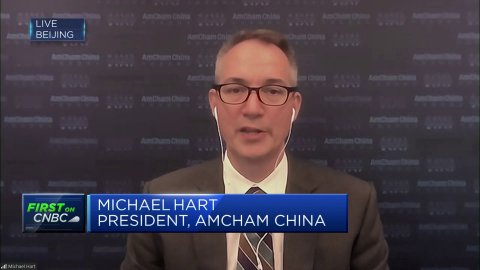
Asia-Pacific markets saw a sell-off on Wednesday, mirroring moves on Wall Street after a decline in U.S. banks.
Shares of and dropped 2%, and dropped 3%. The action came after , including JPMorgan Chase.
Last week, Moody's lowered its rating on 10 U.S. banks while putting for potential downgrades.
In Asia, Japan's slid 1.46% to end at 31,766, the first time it has went below the 32,000 mark in over a month, while the Topix closed down 1.29% at 2,260.84. This is despite business sentiment improving in July, according to the Reuters Tankan survey.
South Korea's came back from a public holiday 1.76% down and closed at 2,525.64, while the Kosdaq saw a larger loss of 2.59% and finished at 878.29, its lowest level since July 11.
In Australia, the slipped 1.5%, closing at 7,195 and notching its third day of losses in four days.
Hong Kong's fell 1.31% in its final hour, while mainland Chinese markets were also lower, with the CSI 300 index 0.73% down and ending at 3,818.33. China saw its house price index fall into contraction territory for the first time since April, dropping 0.1% year on year.
Overnight in the U.S., all three major indexes lost ground, with the falling 1.16% and ending the session below its 50-day moving average. The fell 1.14%, and the slid 1.02% and snapped a three-day positive streak.
— CNBC's Hakyung Kim and Samantha Subin contributed to this report.
New Zealand's central bank has at 5.5% for the second meeting in a row, in line with expectations from economists polled by Reuters.
The Reserve Bank of New Zealand said in a statement that the current level of interest rates is constraining spending and hence inflation pressure.
It added the official cash rate "needs to stay at restrictive levels for the foreseeable future" to ensure that inflation returns to its target range of 1 to 3% while supporting maximum sustainable employment.
— Lim Hui Jie
plummeted nearly 28.7% on Tuesday after the — which could eat into profits.
The Southeast Asian tech giant posted a revenue of $3.09 billion in the quarter, compared with Refinitiv consensus estimate of $3.197 billion.
Total net income in the quarter was $331 million, compared with total net loss of $931.2 million in the same period a year ago.
Forrest Li, chairman and CEO of Sea, said that the firm has "started and will continue to ramp up investments in its core e-commerce business," in a sign that it is reversing its profitability strategy after months of cost cuts.
— Sheila Chiang
Business sentiment among large Japanese businesses ticked up in July, according to the Reuters Tankan survey.
The index for the manufacturing sector climbed to +12 up from +3 in June, while the non-manufacturing index showed a reading of +32, up from +23 in the previous month.
A reading greater than zero represents favorable conditions and below shows unfavorable conditions.
The strong results come after Japan reported stronger-than-expected gross domestic product growth for the second quarter on Tuesday.
— Lim Hui Jie
Despite last week's selloff, the strong rally this year means U.S. markets are now trading at only a small discount compared with the start of the year, says top Morningstar strategist Dave Sekera.
The chief U.S. market strategist told CNBC's " " on Monday that he expects returns to be "much more muted" for the rest of the year.
In fact, now's a good time to be selling and locking in profits on some stocks that have "run up so much [they] are now overvalued and overextended," he said.
He named six such stocks to sell, and told investors to buy five names instead.
— Weizhen Tan
HSBC has identified 9 'unloved stocks' listed on the London Stock Exchange that could be poised to surge over several factors.
The investment bank said UK markets have started to outperform other global indices for the first time this year since the release of the UK's June inflation data on July 18.
The bank's strategists said that the basket of 9 stocks had strongly outperformed the broader FTSE 350 over the past two months, returning 9% compared to a 0.6% decline for the benchmark.
— Ganesh Rao
The selloff Tuesday was broad-based, with 442 S&P 500 names last trading in negative territory. Among the biggest laggards were , and .
Meanwhile, there were just 61 gainers in the S&P 500. The broader index was led by and .
— Sarah Min
Rather than slowing into recession, the U.S. economy is actually gaining significant steam in the third quarter, according to the latest projections from the Atlanta Federal Reserve.
Following an update Tuesday, the Fed district's of incoming data is pointing to growth of 5% for the July-through-September period. That's up from the previous estimate of 4.1% a week ago. Should it hold, that would be the fastest growth since the fourth quarter of 2021.
The upward revision followed retail sales data from the Commerce Department showing that , pushing the estimate for personal consumption expenditures growth to 4.4% from 3.2%. Consumer spending accounts for about one-third of all U.S. economic activity.
—Jeff Cox
Retail sales data for July came in in a sign of continued consumer strength.
The indicator of food service and retail sales grew by 0.7% in July from last month. Economists polled by Dow Jones anticipated a relatively modest 0.4% month-over-month increase.
Excluding automotives, sales grew by 1%. That notably exceeded economists' forecast of 0.4%.
— Alex Harring
, including JPMorgan Chase. The agency already cut its rating on the industry back in June, but another downgrade would force it to reconsider the ratings on the more than 70 banks it covers.
"It's not inevitable that it goes down," analyst Chris Wolfe said. "We could be at AA- for the next 10 years. But if it goes down, there will be consequences."
— Fred Imbert, Hugh Son




